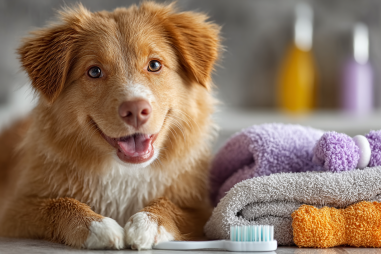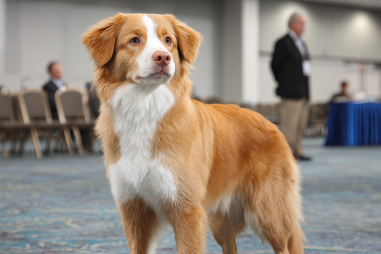Proper socialization is vital for raising a well-rounded and confident Nova Scotia Duck Tolling Retriever. Known affectionately as “Tollers,” these intelligent and energetic dogs thrive when they are comfortable around different people, animals, and environments. Early and thoughtful socialization helps prevent behavior issues, such as fear or aggression, and ensures your toller grows into a happy companion who enjoys exploring the world alongside you. In this article, we’ll explore expert socialization tips tailored specifically for this unique breed, providing you with practical advice on how to nurture your dog’s social skills safely and positively.
Importance of Early Socialization
Socialization is most effective when started early in a puppy’s life. For Nova Scotia Duck Tolling Retrievers, this critical period typically spans from around 3 weeks to 14 weeks of age. During this time, puppies are especially receptive to new experiences and can learn to accept a wide variety of stimuli with confidence. Early socialization lays the foundation for your dog’s future behavior and emotional well-being.
Neglecting to expose your toller puppy to new sights, sounds, people, and other animals during this formative stage can result in fearfulness or reactivity later on. Puppies who are properly socialized tend to be more adaptable, less anxious in new situations, and better equipped to handle the unexpected. For a breed like the toller, which is active and highly intelligent, early positive exposure also prevents boredom and frustration that can lead to destructive behavior.
Exposure to Various People and Animals
A key aspect of socialization is introducing your toller to a variety of people and animals. This helps your dog become comfortable with differences in voices, appearances, and behaviors. Aim to expose your puppy to:
- Men, women, and children of all ages
- People wearing hats, glasses, or uniforms
- Other dog breeds with varying sizes and temperaments
- Friendly cats or other household pets
- Animals they may encounter in your neighborhood or parks
Make these introductions gradual and always use positive reinforcement to help your toller associate these experiences with pleasant outcomes. Treats, praise, and gentle play are excellent rewards. If your toller seems curious but cautious, allow them to observe at a distance before closer interaction.
Introducing Your Dog to New Environments
Beyond people and animals, it’s equally important to expose your toller to diverse environments so they don’t become overwhelmed or fearful of new places. Take your puppy on safe journeys to:
- Parks and walking trails
- Busy streets or sidewalks
- Pet-friendly stores
- Friends’ homes and backyards
- Outdoor events or quiet cafes with dog-friendly patios
Allow your dog to explore with you while always keeping safety in mind. Leash control and supervision are essential. Introduce new environments slowly, watching for any signs of stress, and use treats or toys to encourage calm and confident behavior. Over time, these positive experiences help your Nova Scotia Duck Tolling Retriever transition smoothly between different settings.
Handling Fear and Anxiety
Even with the best socialization efforts, some tollers may display fear or anxiety when faced with new situations, especially if these are unpredictable or overwhelming. It’s important to recognize these signs early and respond with patience and care rather than frustration.
Signs of fear or anxiety can include trembling, cowering, excessive barking, hiding, or even aggressive displays as a defense. When these behaviors arise, reduce the intensity of the experience—step back or remove your dog from the stressful situation if needed. Use calming techniques like slow petting, a gentle voice, and treats to reassure your dog.
Counter-conditioning and desensitization methods can help your toller gradually overcome fears. For example, if your dog is afraid of loud noises, play recordings of sounds at very low volume while distracting them with treats, slowly increasing the volume over time. Working with a professional dog trainer or behaviorist experienced with tollers can be immensely helpful if fear or anxiety issues persist.
Socialization Milestones by Age
Understanding development milestones can guide your socialization strategy throughout your toller’s life:
- 3 to 14 weeks: The prime socialization window when puppies absorb new experiences rapidly and with ease.
- 3 to 6 months: Continued exposure is necessary to reinforce positive interactions; introduce more complex and varied scenarios.
- 6 to 12 months: Adolescence brings increased independence and possible testing of boundaries; maintain consistent socialization routines to support maturity.
- 1 year and beyond: While socialization is most effective during puppyhood, adult tollers can still benefit from continued exposure and training to ensure lifelong adaptability.
Tracking these stages helps you prioritize socialization efforts when they are most effective while reinforcing lessons learned earlier.
Group Classes and Playdates
Group training classes are excellent tools for socialization. Nova Scotia Duck Tolling Retrievers benefit greatly from structured environments where they meet other puppies and adult dogs under professional supervision. These classes teach obedience basics and encourage healthy social interaction, communication, and play skills.
Beyond classes, organizing playdates with other well-socialized dogs helps your toller practice social skills in a relaxed environment. Choose compatible playmates in terms of size and temperament to avoid overwhelming your dog. As always, supervise all interactions and intervene if play becomes too rough or stressful.
Monitoring and Encouraging Positive Interactions
During all socialization activities, it’s essential to monitor your dog closely. Watch for body language cues that reveal comfort or distress. Signs of positive engagement include relaxed posture, wagging tail, playful bowing, and soft vocalizations. Signs your toller is uncomfortable may include stiff body, yawning, lip licking, turning away, or growling.
When your dog exhibits positive behavior, reward them immediately with treats, praise, or play. This builds a strong connection between good social behaviors and enjoyable rewards, which encourages your toller to repeat those behaviors. If you notice negative interactions, gently redirect your dog’s attention and guide them towards more positive experiences.
Troubleshooting Common Social Problems
Despite careful socialization, some tollers develop challenges such as:
- Fearfulness: Gradual desensitization and consistent positive exposure are key. Avoid forcing fearful dogs into overwhelming situations.
- Resource guarding: Teach your toller to share toys and space by trading for treats and supervised interaction.
- Overexcitement: Use calm commands and reward quiet behavior to manage exuberance during play or greeting.
- Aggression: Address any aggressive behavior promptly with professional help to assess triggers and develop a behavior modification plan.
Consistency, patience, and seeking guidance from trainers or behaviorists when needed will help you resolve these problems effectively.
By committing to thorough and thoughtful socialization using these expert tips, you can ensure your Nova Scotia Duck Tolling Retriever grows into a confident and happy partner. Embrace the journey of exploring new people, animals, and places alongside your enthusiastic and intelligent toller, creating a strong bond and a lifetime of joyful adventures.







